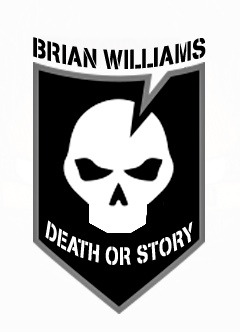 Brian “Get to the choppa!” Williams’s character lapse makes him one.
Brian “Get to the choppa!” Williams’s character lapse makes him one.
So much for Brian Williams’s war-face, eh? I don’t know if some of the Gonzo from his friendship with the late Hunter Thompson rubbed off, but it turns out the Whiskey Tango Foxtrot of Williams’s career may be his having forgotten that journalists aren’t free to insert themselves in the stories they report.
At least Williams had the sense to step away from his anchor desk before NBC could suspend him, as it has. The move separates him from lesser public figures who might busy themselves with all the attention or be convinced by others to turn it in their favor, something that rarely ends well.
There’s also the fact that, as a passenger in a Chinook troop-transport helicopter, your visibility is extremely limited. Without the benefit of combat experience or theater of operations training, it’d be nearly impossible to differentiate which helicopter in any convoy was actually being aimed at. Think about it, amidst all the sounds of combat – automatic weapons fire, shouting, explosions – would you be able to distinguish between RPG rounds and the flash-bang orange glow of infrared countermeasures (ICMs) being released around you? ICMs  are, after all, designed to confuse missile optics and throw off rocket trajectories, and pilots navigating threat zones have to be specially trained for these potentially blinding and disorienting visuals.
are, after all, designed to confuse missile optics and throw off rocket trajectories, and pilots navigating threat zones have to be specially trained for these potentially blinding and disorienting visuals.
Besides, when you’re in a convoy taking fire, it matters little whether the first helicopter is being shot at or the last: the convoy is taking fire. If one of its soldiers gets hit by a piece of shrapnel, he’ll be eligible for a Purple Heart. And we always hear soldiers claim to be all “in this together” and that they’re fighting for the guy next to them.
So while embedded reporters certainly aren’t soldiers, the only real-world recognition they get is an unspoken eligibility to use the word “we.” Williams was in a convoy that took fire, and he technically faced the same danger as the other passengers, in uniform and out. He could’ve been killed. So, “we.” End of story.
 Except that Williams, perhaps suffering from a bout of malignant entitlement, had to go and inflate his mythology, setting aside the vigilance his position requires. In so doing, he surrendered control of his own narrative, of how people see and describe him and his actions.
Except that Williams, perhaps suffering from a bout of malignant entitlement, had to go and inflate his mythology, setting aside the vigilance his position requires. In so doing, he surrendered control of his own narrative, of how people see and describe him and his actions.
And if you’ve read this blog before, you know how that gets me thinking.
In all the coverage, backlash and commentary covering this most pedestrian of journalistic faux pas, I have yet to see anyone point out a very humbling lesson Williams is no doubt learning. He played with the particulars and self aggrandized his place in an already harrowing encounter; he repeatedly exaggerated and reportedly lied; and in so doing, the NBC news anchor unwittingly opened doors through which hangers on and blabbermouths can (and will) enter to repurpose the fallout for their own gain. Here are a few such things Williams has had to face so far:
- Fellow journalist Tom Brokaw has now denied reports he’d initially called for Williams to be fired. (Yeah right.)
- A forgotten weasel of a hotel employee has come forward to claim Williams couldn’t have seen the human bodies he says he watched float past his Ritz-Carlton window during Hurricane Katrina.
- Despite claims to the contrary, “investigators” for NBC-Universal-Comcast have been examining everything from footage of Williams’s various
 retellings to his statements and retraction. They also reportedly interviewed current and former military personnel, NBC news execs, camera guys, and others. How could they not? A well-liked celebrity newsreader with as many industry friends as Williams has doesn’t get a 6-month suspension and a $5 mil haircut, without at least a few lawyers and questions. Never mind that many of Williams’s colleagues have called him a man of character and integrity: who in their right mind would do something to invite Comcast’s corporate ethics Gestapo to decide whether or not that’s true?
retellings to his statements and retraction. They also reportedly interviewed current and former military personnel, NBC news execs, camera guys, and others. How could they not? A well-liked celebrity newsreader with as many industry friends as Williams has doesn’t get a 6-month suspension and a $5 mil haircut, without at least a few lawyers and questions. Never mind that many of Williams’s colleagues have called him a man of character and integrity: who in their right mind would do something to invite Comcast’s corporate ethics Gestapo to decide whether or not that’s true?
 The list will go on, for sure. I know, because I did something similar to myself, and it was a mind-bendingly intense and painful life lesson that inspired both my personal motto (Get character or become one) and the triple award-winner memoir written around it.
The list will go on, for sure. I know, because I did something similar to myself, and it was a mind-bendingly intense and painful life lesson that inspired both my personal motto (Get character or become one) and the triple award-winner memoir written around it.
As one witness after another embellished their testimony during my pretrial hearing for armed robbery, I could do nothing more than frantically scribble, “Never happened – he just tacked that on!” and “No way did I do that!” and “She’s lying! Why is she making this up?” Trying to be reassuring, I suppose, my attorney simply waved each testimony off as if it didn’t matter. But it mattered to me, just too little, too late. Back inside the jail, and later on the prison yard, when I explained this travesty of justice to my fellow inmates, they yawned with boredom. I was the only one who was surprised.
See, I may have chosen to rob only corporate-owned retail chains and pledged never to hit a family-owned business; I may have kept my cool and remained courteous, even during the Christmas rush; and I may never have threatened anyone, pointed a weapon, or shouted. But none of that mattered, because by my own actions, I’d surrendered my right to control the narrative.
 Instead, a parade of individuals looking to inflate their harrowing experiences would be free to decide who I was, what I’d done, and what should be done with me. I’d lacked the character to keep myself out of that situation, so I got funhouse mirrored into one: I became the guy who did the things they said – and what they said contributed to my judgment. State of California has it all on file somewhere. It’s perhaps the most important caution Where Excuses Go to Die offers its readers.
Instead, a parade of individuals looking to inflate their harrowing experiences would be free to decide who I was, what I’d done, and what should be done with me. I’d lacked the character to keep myself out of that situation, so I got funhouse mirrored into one: I became the guy who did the things they said – and what they said contributed to my judgment. State of California has it all on file somewhere. It’s perhaps the most important caution Where Excuses Go to Die offers its readers.
So Brian Williams and I have something in common. He’s about to learn that once you cross that line – once you relinquish your character – how you see yourself (and even the truth) has little impact on the free reign that will be granted to those claiming they’ve been affected by your actions. This difficult lesson has shaped every moment of my life since; I’ll be curious to see what Williams does with it.
